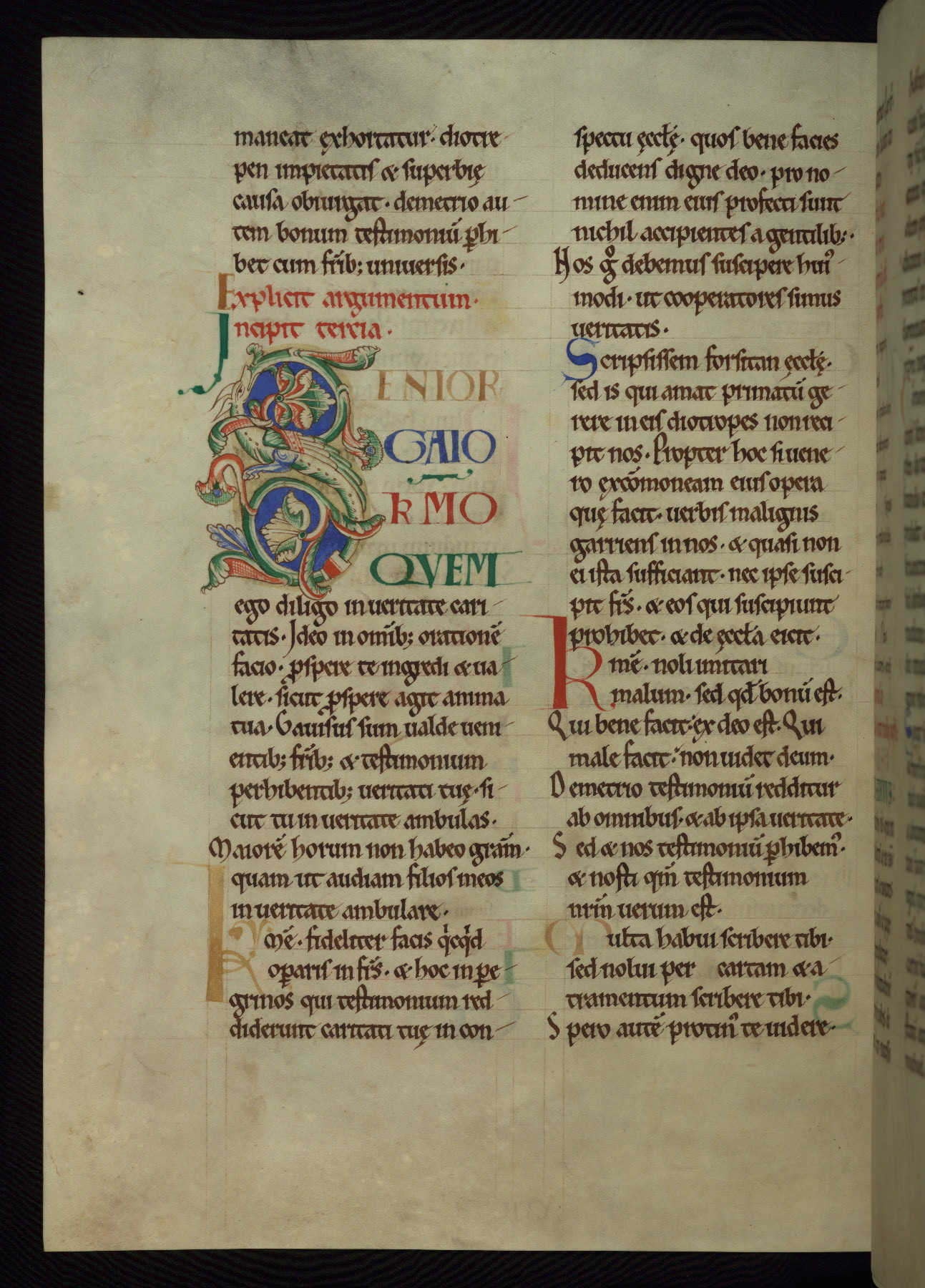 |
A sinuous dragon disgorging a leafy, flowering stalk, itstail terminating in another leafy vine, forms this letter "S" on the titlepage of the Third Epistle of St. John the Apostle.
Rochester New Testament, 1130 AD.
|
Preeminence is one of those superlatives to which we can only hope to aspire. A word with universally positive connotations: distinction, excellence, prominence, renown, superiority, supremacy, transcendence. If someone or something is preeminent ina group, they are more important, powerful, or capable than other people orthings in the group.
The word preeminence occurs only twice in the KJV of the New Testament. In Colossians 1:18, Paul uses the word proteuo [G4409- translated as preeminence in KJV, means to be first or foremost] to describe Jesus Christ.[1] If ever one can be called preeminent, it is the Savior. The word preeminence also appears in John's third epistle as he publicly castigates a shadowy person named Diotrephes: 3 John 1:9. In this case preeminence stems from philoproteuo [G5383], which literally means love of being first (philo = love; proteuo = being first).
I find brief scriptural references to otherwise unknown people fascinating (see my posts on Demas here and here). We know almost nothing about Diotrephes, since his name only appears in this passage. For me, the ESV translation of this passage gives clearer insight into who Diotrephes was and what he was like.
9 I have written something to the church, but Diotrephes, who likes to put himself first, does not acknowledge our authority.
10 So if I come, I will bring up what he is doing, talking wicked nonsense against us. And not content with that, he refuses to welcome the brothers, and also stops those who want to and puts them out of the church.
3 John 1:9-10 (ESV)
Somewhat ironically, his name means 'nourished by Jove'; if you were a superstitious Roman you might think this could lead to preeminence.[2] But it was not legitimate preeminence that led John to publicly call out Diotrephes. It was Diotrephes' desire to put himself first that brought out John's ire.[3] This desire crippled his ability to acknowledge the authority of one of the Twelve. It suggests he was unwilling to defer to the priesthood leadership of the church. He was certainly prone to backbiting and trash-talking about the the church leaders. Finally, it seems that he was bent on driving out those people that he didn't like.
Unfortunately, the Spirit of Diotrephes is alive and well; it is manifest in those that cannot (or will not) submit to the authority of God's earthly (albeit imperfect) representatives. It is heard in the hypercritical appraisals of (admittedly imperfect) women and men that are serving in the church. It is seen in the attempt to create a church that is so homogenous that there simply is not room for those that don't fit the mold.
In a word, the character flaws of Diotrephes can be summarized as pride. It is the sin of putting our will, needs, agenda and self-love ahead of God. Ezra Taft Benson called it the universal sin: it's not just the other guy's problem.
Diotrephes joins a long list of saints that have become defined for their failings. Whether he got it together or continued to buck the system, we'll have to wait and see. It seems pretty clear that individually we need to get it together--the sooner the better--and root out the Spirit of Diotrephes from our lives.
In a word, the character flaws of Diotrephes can be summarized as pride. It is the sin of putting our will, needs, agenda and self-love ahead of God. Ezra Taft Benson called it the universal sin: it's not just the other guy's problem.
Diotrephes joins a long list of saints that have become defined for their failings. Whether he got it together or continued to buck the system, we'll have to wait and see. It seems pretty clear that individually we need to get it together--the sooner the better--and root out the Spirit of Diotrephes from our lives.
[1] In Romans 3:1,Paul uses a related word to describe the lack of preeminence [G4053- perissos] of the Law of Moses, compared to the Law of Christ.
[3] Itypically associate John 'the beloved' with some of the greatest writings inscripture on love. But in his third epistle, he was very annoyed and itcomes through loud and clear.
No comments:
Post a Comment